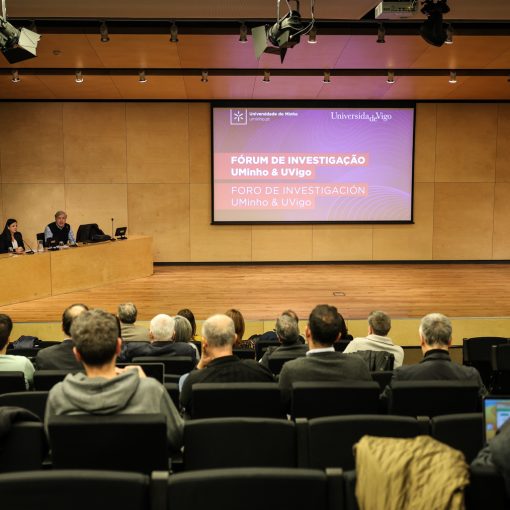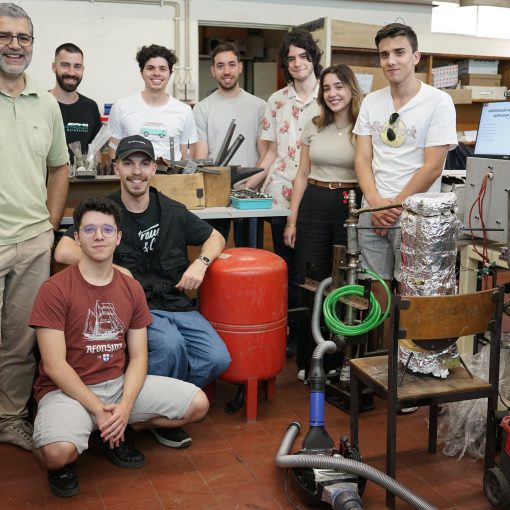The embryo of 21st century networked entertainment, the MOOsaico platform was created in 1994 by UMinho students and was once the only one in the world with bilingual support.
 It is the oldest virtual environment in Portugal and was, for some time, the only one in the world with multilingual support. MOOsaico was born by students of the University of Minho, in October 1993 and officially on January 7, 1994, well before there were mIRC, Blah, Orkut, Hi5, MSN, Facebook and the SMS boom. Hosted on the servers of the Computer Science Department (DI) of the Engineering School of UMinho, in Braga, it was an embryo of 21st century networked entertainment. Each user has a nickname and runs through a kind of map, being able to contact people from all over the world in forums, hobbies and even practice languages and programming. It’s difficult for this cooperative and educational platform to impose itself today on social media like WhatsApp and Zoom, but the curious, nostalgic and independent won’t let it go.
It is the oldest virtual environment in Portugal and was, for some time, the only one in the world with multilingual support. MOOsaico was born by students of the University of Minho, in October 1993 and officially on January 7, 1994, well before there were mIRC, Blah, Orkut, Hi5, MSN, Facebook and the SMS boom. Hosted on the servers of the Computer Science Department (DI) of the Engineering School of UMinho, in Braga, it was an embryo of 21st century networked entertainment. Each user has a nickname and runs through a kind of map, being able to contact people from all over the world in forums, hobbies and even practice languages and programming. It’s difficult for this cooperative and educational platform to impose itself today on social media like WhatsApp and Zoom, but the curious, nostalgic and independent won’t let it go.
“It’s not the first national chat, there were some talkers before, but it’s the first Portuguese MOO, a text-only virtual environment in which you move characters around places, streets and objects, looking for fun, discovery and communication; and it’s not a game, as there are no scores, objectives or winners and losers,” says Paulo Ferreira or Biafra, founder of MOOsaico, a name that evokes the “mosaic of cultures”. Soon after, Rui Mendes, also a student of Mathematics and Computer Science and now a professor at DI, joined as co-administrator. “I was seduced because you could programme in an object-oriented language and thus expand the world with new functionalities,” he defines. The UMinho students helped create in 1995 one of the first Brazilian MOO, for the School of the Future of the University of São Paulo, according to the newspaper O Globo.
Months before, MOOsaico was announced on the well-known Usenet network, by the student Pedro Melo, as an online “international service”. The initial menu of MOOsaico was in English and there were places/objects yet to be translated, as they were created by users outside Portugal. The North American Kent Pitman, father of the Lisp programming language, decided to join to expand what there was in bilingual to multilingual system. In other words, each participant started to be able to recognise, in their own language, the information sent by others, including later in Japanese. In other words, a “tower of Babel” for exchanging experiences, ideas, habits and tastes. By mid 1995, MOOsaico had 400 foreign participants, such as from the USA, the UK, Norway, Brazil, Israel, Switzerland and France. The daily peak was 3000 users and there were even 260 connected simultaneously.
Friendships in cyberwave
 It was the golden age. Many communities appeared in MOOSaico, mainly by university students and from various geographies. For example, from UMinho we chatted, studied and flirted with groups from Richmond, California (USA), we live-interviewed a director in Perth (Australia) in the scope of the Minority Film Week in Braga, we cleared technological doubts about Perl and we promoted roulette and Scrabble challenges. MOOsaic was evoked in the press and in several books, such as Roteiro Prático da Internet (1995), by José Magalhães; Reconceptualizing Teaching Practice (1998), by Mary Lynn Hamilton; and Sprachprodukte und Sprachprozesse in der Computervermittelten Kommunikation (2000), by Hubert Gorczytza.
It was the golden age. Many communities appeared in MOOSaico, mainly by university students and from various geographies. For example, from UMinho we chatted, studied and flirted with groups from Richmond, California (USA), we live-interviewed a director in Perth (Australia) in the scope of the Minority Film Week in Braga, we cleared technological doubts about Perl and we promoted roulette and Scrabble challenges. MOOsaic was evoked in the press and in several books, such as Roteiro Prático da Internet (1995), by José Magalhães; Reconceptualizing Teaching Practice (1998), by Mary Lynn Hamilton; and Sprachprodukte und Sprachprozesse in der Computervermittelten Kommunikation (2000), by Hubert Gorczytza.
If, at the beginning, the “habit” of exchanging white characters on a black background demanded patience with the lag (time between typing a command and its answer), given the speed of the connection to the outside, the problem at UMinho has changed. There were students wanting to do some work in Oracle, for example, but MOO fans were crowding the lab computers, which was the only place where they could access the net. The solution was to prioritize access to those doing assignments. Meanwhile, the MOOsaic server in the DI started to occupy a lot of computer resources. The option was to limit the number of characters connected simultaneously to 200 and not to allow new characters. For security reasons, the Computer Centre of UMinho also closed at that time the external access of labs to students, except for the web, which made characters and accesses via UMinho “disappear”. Several students reacted by distributing flyers on campus, newsletters and a new website.
They were dark years, recalls Biafra, but the hard core remained, the annual mooers dinners took place in places like Braga, Porto, Guimarães, Lisbon or Bairrada and many of those who had finished university continued to be active online. The computer evolution allowed to have a machine at the DI dedicated to this virtual community, the volume of characters grew and, in the computer labs, the new students (many of them born after MOOsaico) were sensitized to join that network, which in 2006 gained sound, such as doors closing, animals and roulette shots.
“MOOsaico has even more meaning today, its rooms can serve to debate topics and everyone who wants to participate enters and speaks freely, without the filtering of current social networks,” notes Sérgio Peixoto, who attended Mathematics and Computer Science in 1994/95 and re-enrolled this academic year. “It makes perfect sense for the academic community to use this space, people check the rooms that interest them, enter them and brainstorm”, he highlights. “The most important thing is not what you build, but that you do it with pride for a world where everyone can explore and learn”, stresses the motto of this virtual network. For those who have doubts about logging in or have forgotten their password, just send an email. You can also write Help or access as a guest and receive tips: Who to see who is online, Look to look around, Ways to use the cardinal points, i to know what you are carrying …”
Source: NÓS



